Unit 6 Sunshine for all Integrated skills 课件(共18张PPT,内嵌音频)
文档属性
| 名称 | Unit 6 Sunshine for all Integrated skills 课件(共18张PPT,内嵌音频) |  | |
| 格式 | pptx | ||
| 文件大小 | 10.6MB | ||
| 资源类型 | 教案 | ||
| 版本资源 | 牛津译林版 | ||
| 科目 | 英语 | ||
| 更新时间 | 2022-03-15 20:58:44 | ||
图片预览

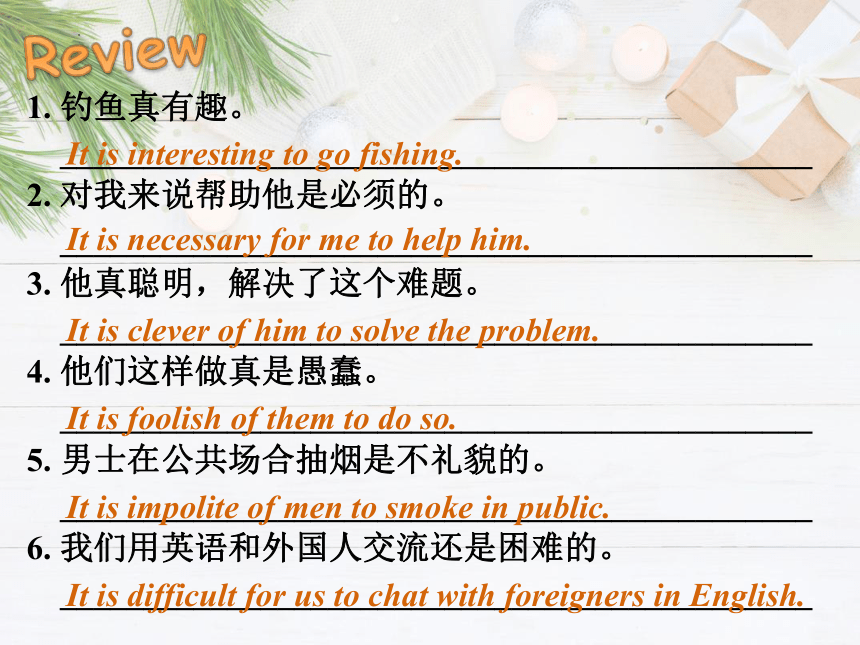
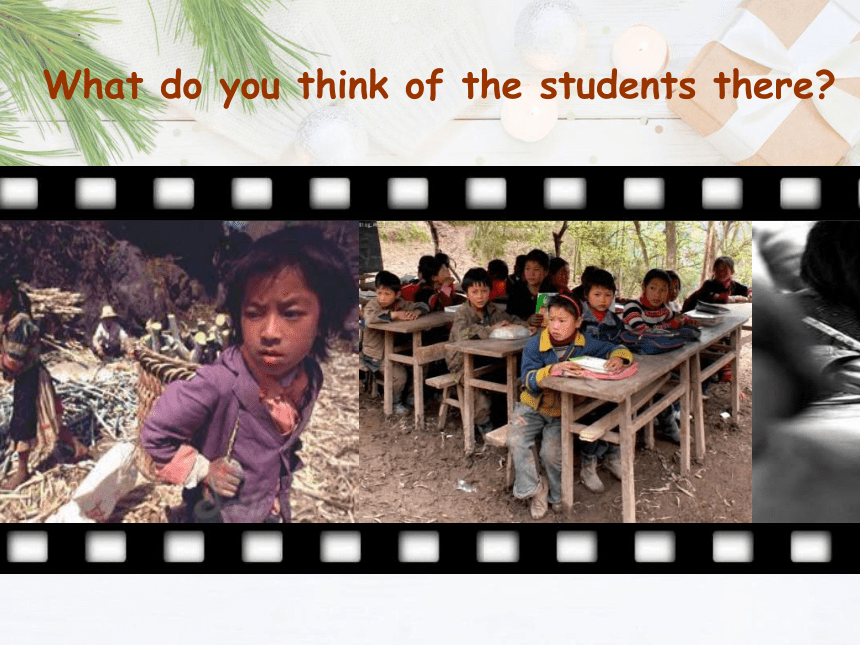
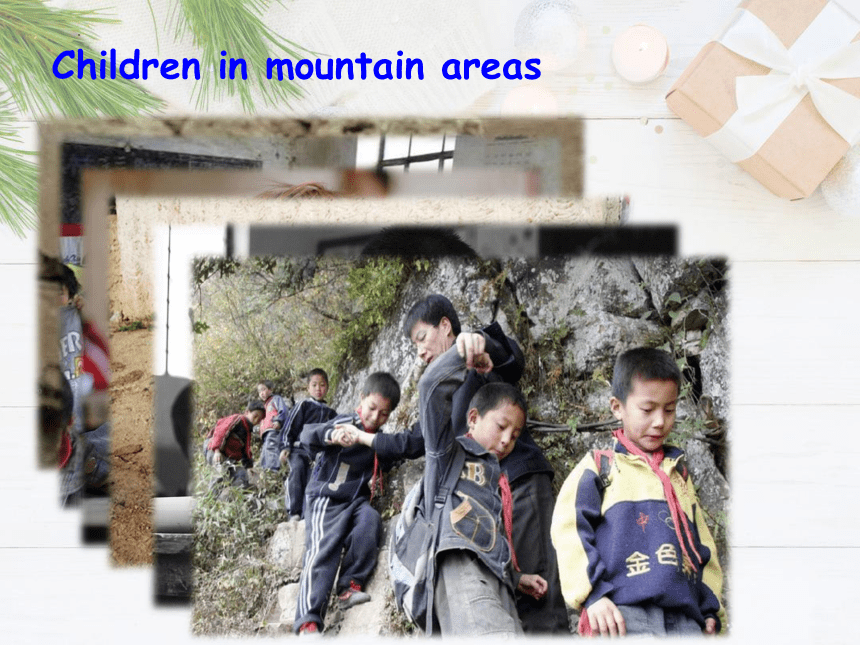
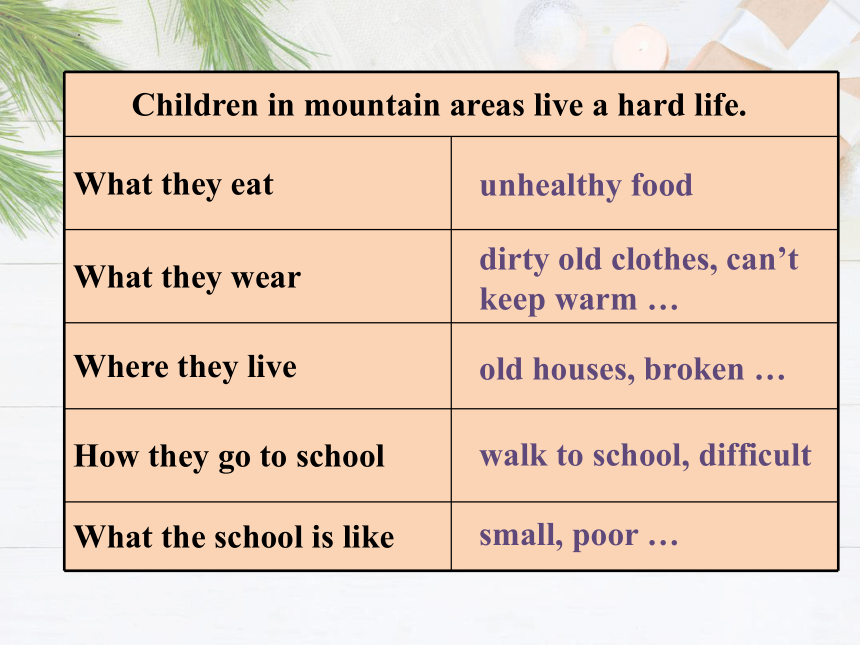

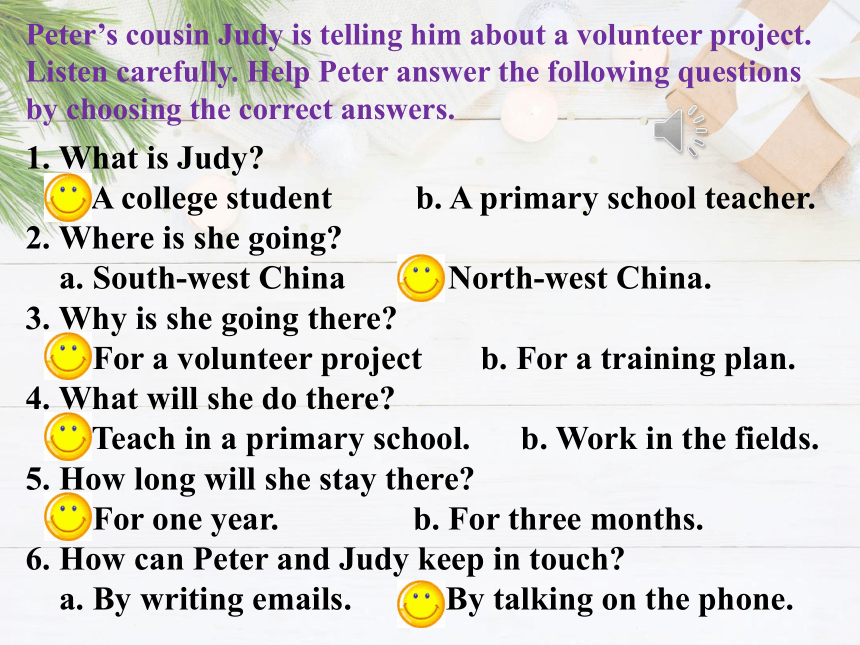
文档简介
(共18张PPT,内嵌音频)
Unit 6 Sunshine for all
Integrated skills
Review
1. 钓鱼真有趣。
_____________________________________________
2. 对我来说帮助他是必须的。
_____________________________________________
3. 他真聪明,解决了这个难题。
_____________________________________________
4. 他们这样做真是愚蠢。
_____________________________________________
5. 男士在公共场合抽烟是不礼貌的。
_____________________________________________
6. 我们用英语和外国人交流还是困难的。
_____________________________________________
It is interesting to go fishing.
It is necessary for me to help him.
It is clever of him to solve the problem.
It is foolish of them to do so.
It is impolite of men to smoke in public.
It is difficult for us to chat with foreigners in English.
What do you think of the students there
Children in mountain areas
Children in mountain areas live a hard life.
What they eat
What they wear
Where they live
How they go to school
What the school is like
unhealthy food
dirty old clothes, can’t keep warm …
old houses, broken …
walk to school, difficult
small, poor …
Do you want to be a volunteer
Peter’s cousin Judy is telling him about a volunteer project. Listen carefully. Help Peter answer the following questions by choosing the correct answers.
1. What is Judy
a. A college student b. A primary school teacher.
2. Where is she going
a. South-west China b. North-west China.
3. Why is she going there
a. For a volunteer project b. For a training plan.
4. What will she do there
a. Teach in a primary school. b. Work in the fields.
5. How long will she stay there
a. For one year. b. For three months.
6. How can Peter and Judy keep in touch
a. By writing emails. b. By talking on the phone.
Pair work
What’s school like How about Judy’s volunteer life there Can you guess
Judy’s volunteer life
Peter’s questions Your predictions
What’s the school like
Are the students all from the villages there
What subjects do you teach
Are they happy to be with you
What do you think of this experience
Judy is talking to Peter on the phone about her experience. Listen to their conversation and help Peter complete his notes.
School: a very (1) ______ school in a (2) _________ area
only (3) ____ classrooms
Students: live in villages (4) __________
walk for more than (5) _______ to get to school
Judy’s life: teaches them Chinese, (6) ________ and Maths
teaches them (7) ______ after class
gives them a lot of (8) ________
What she thinks: meaningful to learn more about
(9) ______________ of China
helpful to (10) _______ the children there
small
mountain
six
far away
an hour
English
songs
books
the poor areas
teach
Peter is writing about Judy and the village school in his diary. Help him complete his diary entry with the information in Parts A1 and A2.
My cousin Judy has taken part in a (1) _______________ in her college. She works as a primary school (2) __________ in North-west China for (3) ____________.
The school is very (4) _______. There are only (5) ______________ in the school. Most of the students live (6) ____________ and they have to walk for more than (7) _________ to get to school.
volunteer project
teacher
one year
small
six classrooms
far away
an hour
Judy works hard there. She teaches them Chinese, (8) _________ and Maths. After class, she sometimes teaches them (9) ______. She also gives them (10) _____________ to read.
Judy thinks it is meaningful for college students to learn more about (11) _________________ of China. It is also helpful of them to (12) ________ the children there. In this way, they can help local people improve their lives.
English
songs
a lot of books
the poor areas
teach
Listen and answer
1. How many ways are mentioned in the dialogue
Four.
2. How can we help homeless people
We can give food to them.
3. How can we help the elderly
We can give our seats on the bus to the elderly.
The Class 1, Grade 8 students are talking about how to help people in their daily lives. Listen to their conversation and answer the following questions.
Pair work
A: How can we help people in our daily lives
B: We can ......
A: I agree. And it’s meaningful to ……
B: We can also ……
A: Yes. And it’s good to ……
Useful phrases and expressions
1. teach in a primary school 在一所小学教书
2. talk on the phone 通过电话交谈
3. work in a mountain area 在山区工作
4. more than an hour 超过一小时
5. in this way 以这种方法
6. in our daily lives 在我们日常生活中
7. save our pocket money 节省我们的零花钱
Exercises
I. 根据首字母或中文提示填空。
1. She is going the ___________ (西北方) of China.
2. The local people hope to ________ (提高) their lives.
3. We should help those people in need in our d____ life.
4. Simon d______ his pocket money to the disabled person yesterday.
5. These ____________ (组织) need plenty of volunteers.
6. The local government has planned a new building _________ (工程) in Renmin Road.
7. John had an exciting ____________ (经历) in the USA last year.
north-west
improve
aily
onated
organizations
project
experience
II. 单项选择。
1. Millie finds ________ interesting ________ the difference between the two words.
A. /; to learn B. it; learning
C. it; to learn D. /; learning
2. It’s careless ____ him to make the same mistake. I think it important ___ him to be more careful next time.
A. to; for B. for; of C. of; to D. of; for
3. _______, you can improve your maths day by day.
A. By this way B. On this way
C. In this way D. To this way
4. That question is too hard _____________.
A. answering B. to answer
C. to be answered D. to answer it
5. ____ is necessary for us ________ our own dreams.
A. That; have B. It; have
C. That; having D. It; to have
6. We’ll _______ some money by holding a charity show, then _______ it to poor students in the west.
A. raise, raise B. donate, donate
C. raise, donate D. donate, raise
7. Although he was a child, he tried to find ways _______ people _____ a better life.
A. to help; enjoy B. help; enjoy
C. to help; enjoying D. help; enjoying
8. It’s not easy ______ him to take care of ______ many children during the trip.
A. of; such B. for; such C. of; so D. for; so
Thank you!
Unit 6 Sunshine for all
Integrated skills
Review
1. 钓鱼真有趣。
_____________________________________________
2. 对我来说帮助他是必须的。
_____________________________________________
3. 他真聪明,解决了这个难题。
_____________________________________________
4. 他们这样做真是愚蠢。
_____________________________________________
5. 男士在公共场合抽烟是不礼貌的。
_____________________________________________
6. 我们用英语和外国人交流还是困难的。
_____________________________________________
It is interesting to go fishing.
It is necessary for me to help him.
It is clever of him to solve the problem.
It is foolish of them to do so.
It is impolite of men to smoke in public.
It is difficult for us to chat with foreigners in English.
What do you think of the students there
Children in mountain areas
Children in mountain areas live a hard life.
What they eat
What they wear
Where they live
How they go to school
What the school is like
unhealthy food
dirty old clothes, can’t keep warm …
old houses, broken …
walk to school, difficult
small, poor …
Do you want to be a volunteer
Peter’s cousin Judy is telling him about a volunteer project. Listen carefully. Help Peter answer the following questions by choosing the correct answers.
1. What is Judy
a. A college student b. A primary school teacher.
2. Where is she going
a. South-west China b. North-west China.
3. Why is she going there
a. For a volunteer project b. For a training plan.
4. What will she do there
a. Teach in a primary school. b. Work in the fields.
5. How long will she stay there
a. For one year. b. For three months.
6. How can Peter and Judy keep in touch
a. By writing emails. b. By talking on the phone.
Pair work
What’s school like How about Judy’s volunteer life there Can you guess
Judy’s volunteer life
Peter’s questions Your predictions
What’s the school like
Are the students all from the villages there
What subjects do you teach
Are they happy to be with you
What do you think of this experience
Judy is talking to Peter on the phone about her experience. Listen to their conversation and help Peter complete his notes.
School: a very (1) ______ school in a (2) _________ area
only (3) ____ classrooms
Students: live in villages (4) __________
walk for more than (5) _______ to get to school
Judy’s life: teaches them Chinese, (6) ________ and Maths
teaches them (7) ______ after class
gives them a lot of (8) ________
What she thinks: meaningful to learn more about
(9) ______________ of China
helpful to (10) _______ the children there
small
mountain
six
far away
an hour
English
songs
books
the poor areas
teach
Peter is writing about Judy and the village school in his diary. Help him complete his diary entry with the information in Parts A1 and A2.
My cousin Judy has taken part in a (1) _______________ in her college. She works as a primary school (2) __________ in North-west China for (3) ____________.
The school is very (4) _______. There are only (5) ______________ in the school. Most of the students live (6) ____________ and they have to walk for more than (7) _________ to get to school.
volunteer project
teacher
one year
small
six classrooms
far away
an hour
Judy works hard there. She teaches them Chinese, (8) _________ and Maths. After class, she sometimes teaches them (9) ______. She also gives them (10) _____________ to read.
Judy thinks it is meaningful for college students to learn more about (11) _________________ of China. It is also helpful of them to (12) ________ the children there. In this way, they can help local people improve their lives.
English
songs
a lot of books
the poor areas
teach
Listen and answer
1. How many ways are mentioned in the dialogue
Four.
2. How can we help homeless people
We can give food to them.
3. How can we help the elderly
We can give our seats on the bus to the elderly.
The Class 1, Grade 8 students are talking about how to help people in their daily lives. Listen to their conversation and answer the following questions.
Pair work
A: How can we help people in our daily lives
B: We can ......
A: I agree. And it’s meaningful to ……
B: We can also ……
A: Yes. And it’s good to ……
Useful phrases and expressions
1. teach in a primary school 在一所小学教书
2. talk on the phone 通过电话交谈
3. work in a mountain area 在山区工作
4. more than an hour 超过一小时
5. in this way 以这种方法
6. in our daily lives 在我们日常生活中
7. save our pocket money 节省我们的零花钱
Exercises
I. 根据首字母或中文提示填空。
1. She is going the ___________ (西北方) of China.
2. The local people hope to ________ (提高) their lives.
3. We should help those people in need in our d____ life.
4. Simon d______ his pocket money to the disabled person yesterday.
5. These ____________ (组织) need plenty of volunteers.
6. The local government has planned a new building _________ (工程) in Renmin Road.
7. John had an exciting ____________ (经历) in the USA last year.
north-west
improve
aily
onated
organizations
project
experience
II. 单项选择。
1. Millie finds ________ interesting ________ the difference between the two words.
A. /; to learn B. it; learning
C. it; to learn D. /; learning
2. It’s careless ____ him to make the same mistake. I think it important ___ him to be more careful next time.
A. to; for B. for; of C. of; to D. of; for
3. _______, you can improve your maths day by day.
A. By this way B. On this way
C. In this way D. To this way
4. That question is too hard _____________.
A. answering B. to answer
C. to be answered D. to answer it
5. ____ is necessary for us ________ our own dreams.
A. That; have B. It; have
C. That; having D. It; to have
6. We’ll _______ some money by holding a charity show, then _______ it to poor students in the west.
A. raise, raise B. donate, donate
C. raise, donate D. donate, raise
7. Although he was a child, he tried to find ways _______ people _____ a better life.
A. to help; enjoy B. help; enjoy
C. to help; enjoying D. help; enjoying
8. It’s not easy ______ him to take care of ______ many children during the trip.
A. of; such B. for; such C. of; so D. for; so
Thank you!
